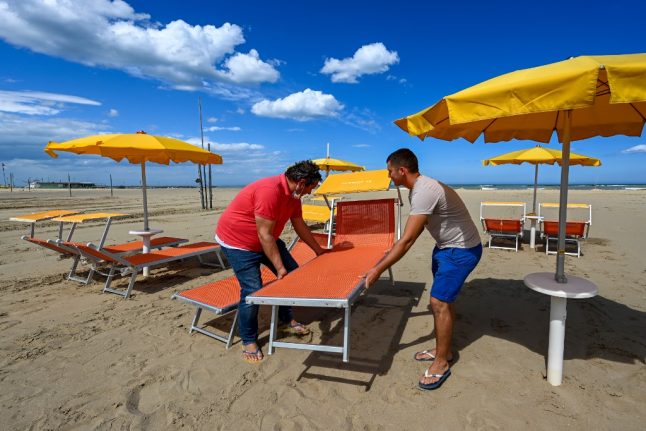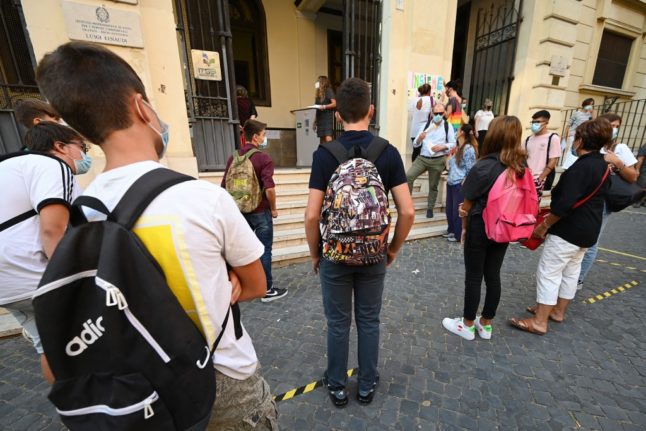Prime Minister Giuseppe Conte also said on Saturday that gyms and cinemas would soon be able to welcome the public again, as the government seeks to restart economic activity while treading cautiously amid the lingering, though waning, coronavirus.
“We're facing a calculated risk in the knowledge that the contagion curve may rise again,” Conte said during a televised address.
“We have to accept it otherwise we will never be able to start up again.”
Prime Minister Giuseppe Conte enforced the nationwide shutdown in early March to counter a pandemic that has so far killed nearly 32,000 people in Italy.
READ ALSO: What you need to know about Italy's 'Relaunch Decree'
The shutdown halted all holiday-making in a country heavily dependent on the tourism industry.
Although Italy never formally closed its borders and has allowed people to cross back and forth for work or health reasons, it banned movement for tourism and imposed a two-week isolation period for new arrivals.
In March, the European Union banned foreign nationals from entering its Schengen zone, an open border zone comprising 22 of 27 member states, with exceptions for medical workers and essential travel.
The external borders of the EU remain closed to non-essential travel until June 15th.
On Wednesday, the EU set out plans for a phased restart of summer travel, urging member states to reopen its internal borders, while recommending that external borders remain shut for most travel until at least the middle of June.
In a press release, Italy's government did not explicitly state which foreign nationals would be allowed to enter, but said its new measures respected the “legal order of the European Union”.
Beginning on June 3rd, visitors within the Schengen zone will be allowed to enter Italy with no obligation to self-isolate. Italians will also be able to move between regions, though local authorities can limit travel if infections spike.
Movements to and from abroad can be limited by regional decree “in relation to specific states and territories, in accordance with the principles of adequacy and proportionality to the epidemiological risk”, the government said.
Meanwhile restrictions on travel within the same region will be dropped from Monday, May 18th, the draft states.
That means that, as expected, you will no longer need an 'autocertificazione' form to go outside after this weekend.

A view taken on May 12, 2020 shows a woman walking along the port of Cesenatico on the Adriatic coast, northeastern Italy, during the country's lockdown aimed at curbing the spread of the COVID-19 infection, caused by the novel coronavirus.
Vincenzo PINTO / AFP
And while currently you can only leave your own town for urgent or essential reasons, from Monday you'll be able to visit friends, stay at your second home, go to the beach or take a holiday within your own region – unless the regional authorities there decide otherwise.
The latest decree is welcome news for Italy's agricultural sector, which relies on roughly 350,000 seasonal workers from abroad.
Farming lobby group Coldiretti said farms were already preparing to organise some 150,000 workers from places including Romania, Poland and Bulgaria.
The peak of Italy's contagion passed at the end of March but with experts warning a second wave cannot be ruled out, Conte had been reluctant to lift the lockdown quickly.
He faced pressure from Italy's regional governments, with some already allowing businesses to reopen before the restrictions were lifted.
READ ALSO: Why some Italian regions have reopened sooner than others
Restaurants, bars and hairdressers are being allowed to reopen on Monday, two weeks earlier than initially planned.
Shops will also open and Italians will finally be able to see friends, as long as they live within their same region.
Church services will begin again but people will have to follow social distancing rules and holy water fonts will be empty. Mosques will also reopen. Gatherings of large groups are still banned.



 Please whitelist us to continue reading.
Please whitelist us to continue reading.
Member comments